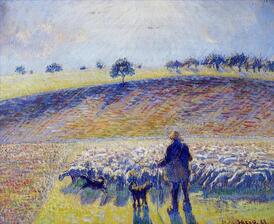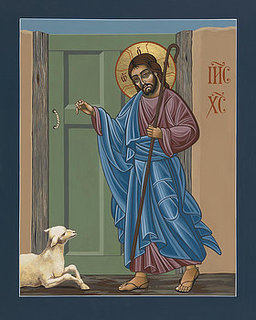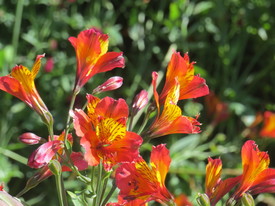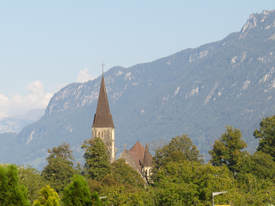 The most important aspect of any relationship is the trust which comes from honesty and truthfulness. Truth is the glue which holds friendships together and it is what nurtures love and growth in all relationships, including that which we have with ourselves. Being truthful, and therefore authentic, can be incredibly challenging when we are facing difficult issues, especially personal ones, and it is equally challenging if we know we need to help another person face something which they do not want to see. Jesus said the truth would set us free, but it is one of the most difficult aspects involved in loving someone; it takes courage to live in the truth. This is why many people did not like prophets in biblical times. Prophets often pointed out harsh realities, and in laying out the truth without whitewashing it, many people were ‘offended’ because they did not want to hear that they were in need of making changes. The prophet Amos was such a prophet, faced with the burden of presenting the truth in the midst of a culture that did not want to hear God’s message. His words were biting, but it was because he cared intensely about his nation and he loved God deeply; therefore he regarded truth highly and was willing to carry the burden of garnering attention in the public forum with an unpopular message. But for all Amos’ challenging words, his message ends with hope, the sign of a true prophet: if God is truly behind the words, the message will always remind us that He wants His people to be near to Him in the joy and protection of His love.  Amos was not from high society, he was not a priest, and he was not anyone particularly important in his community. He was a simple man, a shepherd and a dresser of sycamore trees. Because of his humility, he did not reveal his background until the seventh of the nine chapters in the book which bears his name. At the time he was being confronted by Amaziah, the priest who ultimately exiled him from Bethel, a major city in Israel. In response to the priest Amos said: “I was no prophet, nor have I belonged to a company of prophets; I was a shepherd and a dresser of sycamores. The Lord took me from following the flock, and said to me, Go, prophesy to my people Israel.” (Amos 7:14-15) It seems that Amos was minding his own business, working two jobs to eke out a living, when God told him to go and speak a message which was going to anger many. That God chose him in this way is not a sign that God will swoop down at any time and randomly choose a person and throw him or her into the proverbial fire. Rather it reveals to us that Amos was a person of faith, who was no doubt very disturbed at the trends in his divided nation. Israel had separated from Judah and the people were morally corrupt, vulnerable to their enemies and headed for destruction. Surely Amos prayed faithfully to God about this situation, and when God decided to choose him, he freely accepted the ministry. He revered God’s truth because his relationship with God was based upon a covenant of love and trust.  Because of the themes of his prophetic message, Amos is often referred to as the prophet of social justice. He continually reminded the people of the commandments dealing with relationship to others, and of course, their relationship with God. The astringent words he spoke were meant to shake them up as he confronted their sins head-on, the worst of which was the idolatry which consumed them. Amos even stood up to the king, Jeroboam, because he had set up shrines all over Israel in fear that the people would defect to Judah where the Temple which housed the Ark of the Covenant was located. He decried their ‘worship’ because people were not only sacrificing to false gods, but they were participating in pagan practices which included sexual immorality and lack of proper care for their dead. He condemned how the rich were grossly oppressing the poor, spending money on luxury and abusing alcohol; and he refuted their corrupt business practices, because they accepted bribes and the like. The result of their hedonistic and self-centered lifestyle was that they had no concern about the true state of affairs in their broken covenantal relationship with God or with one another. And they had their ‘heads in the sand’ in regard to the disaster their nation was facing due to their rejection of God: their enemies were already crossing their borders planning to overtake and imprison them. Destruction was brewing and they refused to acknowledge that they were in any danger.  Prophets are called to disturb our complacency, so when we read them, (and I recommend reading the Book of Amos with an eye to seeing our own times within them), we must keep in mind that the harshness of the words is because the prophet must get our attention. Prophets intend to shock their listeners because the sins they point out are indeed shocking and destructive. The lies which people had accepted in place of the truth of God’s plan had so corrupted their hearts that Amos had to confront the lies with the light of reality, a light that often is painful, but necessary. The prophet’s role was, (and still is), to unmask lies and to reveal truth; when people are in denial as to the true path of justice, mercy, kindness and love, the only way is to tell them where the false path will lead them is with stark reality. But we must not miss the underlying truth in the Book of Amos which is that ultimately God is a God of concern who cares deeply about His people. Amos would not have stepped into this role had he not believed that God truly cares.  The words of Amos are of the utmost relevance to us today. His warning is of the danger of getting trapped in self-centeredness and therefore forgetting the gospel values we are called to live, and to beware of completely missing the mark by getting caught up in that which divides instead of that which unites. The life of Amos reminds us that even ordinary folk can live prophetically; we do not need a theological background in order to get the message of God out to His people. But what we do need is the courage to live the gospel as lovers of truth, as fierce defenders of our faith through commitment to our covenant of love with God, and as those who stand against greed, oppression, immorality, and idolizing people and things rather than placing our full attention upon the God who loves us. This is what will make us prophets, even if we are simply ‘shepherds and dressers of sycamores.’ We are not necessarily called to challenge in the same way Amos was, (though there is a need for that kind of prophet, too.) Rather, we are called to do as Jesus did, which is to live the truth by our words and deeds. We are meant to be active in combating sin and falsehood, injustice and mercilessness. Simple men and women can do extraordinary things if we adhere to the gospel and ground our lives on the truth of God which comes through prayer, reflection, Scripture study, and discernment and then putting into action what we have learned.  As disciples of Jesus we are meant to live prophetically, though it takes courage and conviction to do so. But everything we need is found in God and in the grace He gives to live out our call. The Book of Amos teaches us that even shepherds and dressers of sycamores can reveal truth in the face of lies; through the witness of our love we can confront those who are on the wrong path, leading them back to God and the way of the Gospel. Of course, love and mercy are the gospel way, though sometimes love must take on the form of challenge. Even if our efforts seem to fall on deaf ears, we must remain strong in our belief and in what Amos says in the final words of his prophecy: “I will bring about the restoration of my people Israel; they shall rebuild and inhabit their ruined cities, plant vineyards and drink the wine, set out gardens and eat the fruits. I will plant them upon their own ground; never again shall they be plucked from the land I have given them, say I, the Lord, your God.” (Amos 9:14-15) There is always hope found in God’s faithfulness to us which is shown throughout the Scriptures and especially through Jesus Christ. Let us then, live prophetically as ‘shepherds and dressers of sycamores,’ humble, yet empowered by the love of our good and gracious God.  May we find strength in the witness of the prophet Amos! May we have the courage to be faithful to the call of the Gospels! May we persevere in our prayer and in our efforts to discern how to respond in our world today! May we live our call to be prophetic wisely and humbly in the understanding that even if we are ordinary and lowly, all our efforts are important in building the Kingdom! May we call upon the intercession of the angels, saints, and holy ones that we might stand firm upon the power of love and mercy! And may we live in the Truth, that is, may we live in Christ, bringing His love outward in all we do! ©Michele L. Catanese Note: Next post November 5. Images: 1. I took this photo of Mont Blanc, France, during a trip to the Alps recently. I chose to use it here as a symbol of the everlasting foundation we have in our covenant with God. 2. This is an Orthodox icon of Amos the prophet. I chose it because I liked the simplicity of the depiction of Amos. 3. This painting is called Shepherd and Sheep by Camille Pissarro. (1888) It seemed to fit perfectly with the sense of the humble background of Amos. He may have spoken forcefully, but he was from Tekoa, a peaceful and simple area of Judah, which he left behind to go to Israel in response to the call of God. 4. This is one of my photos, taken in Big Bend, west Texas. I chose it because of the starkness of the desert, in counterpoint to the life which is found there. The words of a prophet might seem stark and harsh, but there is always a call to life which is within their words. 5. This icon is called El Buen Pastor, by Fr. William Hart McNichols. I chose it here because it seemed quite appropriate to remember that Jesus referred to Himself as the Good Shepherd in the Gospel of John. He knocks: are we listening? If you are interested in obtaining a copy of this in one of a number of mediums, you can find it at fineartamerica.com/featured/el-buen-pastor-188-william-hart-mcnichols.html. 6. This is another of my photos. These flowers were in the beautiful gardens at Larnach Castle in Dunedin, New Zealand. They seemed to exemplify the words of God given by Amos in the quote. 7. This is also one of my photos. I took this is Switzerland as we were traveling. I chose to use it here as a symbol of the Church, the people of God, rising above that which seeks to divide us. It is intended as a sign of hope. NOTE: In compliance with GDPR rules, I wish to make it clear that I do not gather any information on any of my readers at any time.
Mare
10/22/2018 08:26:22 am
Michele,
Topsy Meyer
10/23/2018 12:09:32 pm
Lovely Blog in these difficult and uncertain times. Comments are closed.
|
Heart Speaks to Heart
|

 RSS Feed
RSS Feed

